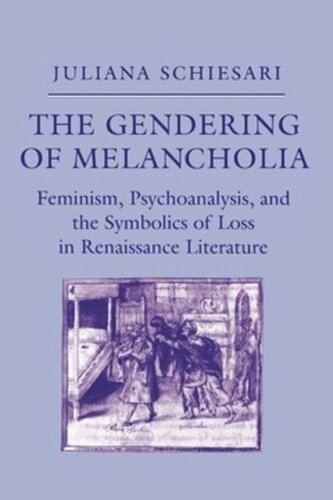

Most ebook files are in PDF format, so you can easily read them using various software such as Foxit Reader or directly on the Google Chrome browser.
Some ebook files are released by publishers in other formats such as .awz, .mobi, .epub, .fb2, etc. You may need to install specific software to read these formats on mobile/PC, such as Calibre.
Please read the tutorial at this link: https://ebookbell.com/faq
We offer FREE conversion to the popular formats you request; however, this may take some time. Therefore, right after payment, please email us, and we will try to provide the service as quickly as possible.
For some exceptional file formats or broken links (if any), please refrain from opening any disputes. Instead, email us first, and we will try to assist within a maximum of 6 hours.
EbookBell Team

0.0
0 reviewsThe pantheon of renowned melancholics—from Shakespeare's Hamlet to Walter Benjamin—includes no women, an absence that in Juliana Schiesari's view points less to a dearth of unhappy women in patriarchal culture than to the lack of significance accorded to women's grief. Through penetrating readings of texts from Aristotle to Kristeva, she illuminates the complex history of the symbolics of loss in Renaissance literature.
The pantheon of renowned melancholics—from Shakespeare's Hamlet to Walter Benjamin—includes no women, an absence that in Juliana Schiesari's view points less to a dearth of unhappy women in patriarchal culture than to the lack of significance accorded to women's grief. Through penetrating readings of texts from Aristotle to Kristeva, she illuminates the complex history of the symbolics of loss in Renaissance literature.
Schiesari first considers the development of the concept of melancholia in the writings of Freud and then surveys recent responses
by such theorists as Luce Irigaray, KaJa Silverman, and Julia Kristeva. Schiesari provides fresh interpretations of works by Aristotle, Hildegard of Bingen, and Ficino and she considers women's poetry of the Italian Renaissance, key works by Tasso and Shakespeare, and the writings of Walter Benjamin and Jacques Lacan. According to Schiesari, male melancholia was celebrated during the Renaissance as a sign of inspired genius, at the same time as public rituals of mourning led by women were suppressed.
The Gendering of Melancholia will be stimulating reading for scholars and students in the fields of feminist criticism, psychoanalytic and literary theory, and Renaissance studies, and for anyone interested in Western cultural history.